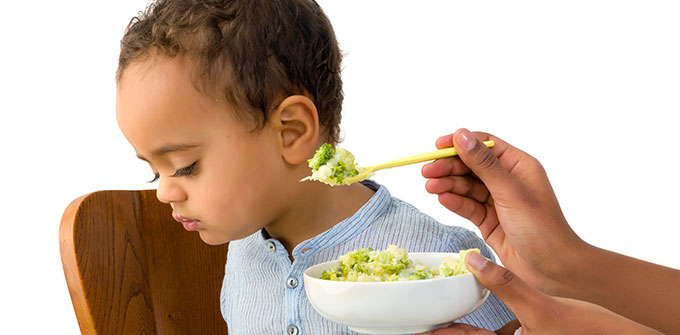Mealtimes can become very frustrating when you’re dealing with a fussy eater. You have slaved over a delicious meal and your kid is not eating a piece, don’t take it personally it’s probably not your cooking; they’re going through the picky eating phase they will eventually grow out of. Until then, we have our top 8 tips on ways you can tackle fussy eating.
Lead by Example
Your child is less likely to snack on vegetables if you are eating something much yummier, like chocolate. Most of children’s eating habits come from their parents so you have to lead by example if you want them to follow. When you are eating together, show you are enjoying your vegetables and they will be much more open to trying them.
Make Mealtimes Fun
When plating up your child’s meal you should try and think of a creative way to make it look more appealing. They’ll find the food much more interesting if it’s placed on a funny patterned plate or the food is organised into a smiley face.
Get them involved
Usually kids are not involved in the process of making a meal but your child will be more likely to eat something they have helped you make. Try to get them involved in the preparation of making a meal, they can get the ingredients out for you and contribute to any mixing you need doing. They should experience a sense of pride in helping towards making the meal and will want to taste their handy work. Cooking with your child can also be a great way to bond with them, see here for more information.
Give them control
One of the reasons for fussy eating, has come from your kid not having control over what they eat; they have food put in front of them that they are expected to eat. Try putting your meals in a big bowl in the middle of the table and help your child serve themselves so they have more control and choice over which foods they would like to eat.
Avoid Food Rewards
Telling your child, ‘you cannot have a chocolate bar if you do not eat your vegetables first’ does not teach them the right mind-set towards healthy food. They think of it as something bad that must require a reward for eating. Instead of offering food as a reward for eating healthy food, say you’ll take them to the park for a play.
Hide your frustration
Try not to draw attention to your fussy eater and make a big issue out of it, as they’ll continue if it encourages a reaction from you. If your child is refusing a meal, wait until you have all finished and clear the plate without making a comment. It can be tough to hide your frustration but stay strong!
Eat Together
Fussy eating can occur because your child is eating a different time to everyone else and when something more interesting is happening. If you eat your meals as a family, your child will have fewer distractions and they will see you are all eating the same food which can be a positive factor in deterring fussy eating.
Children’s Tastes Change
Your child won’t be a fussy eater forever, they should eventually grow past this stage. Don’t be afraid to repeat a meal they previously refused, they might have changed their minds and now want to try it.
The main thing to remember is to be patient and don’t try to force foods to your child that they really don’t want to eat. As they grow up and socialize more their eating habits will change and their friends will encourage them to try a variety of foods.
Does your child have bad eating habits? See what can help here.

